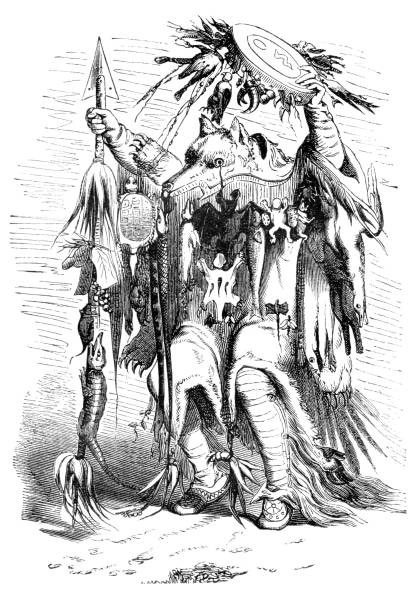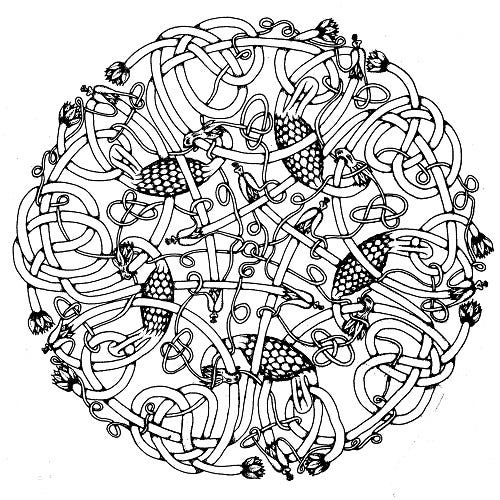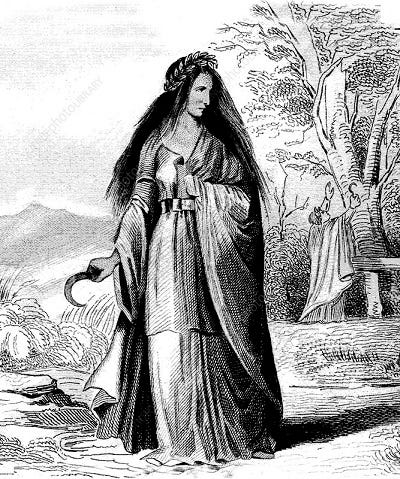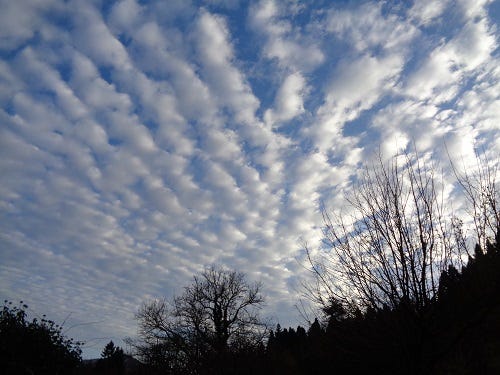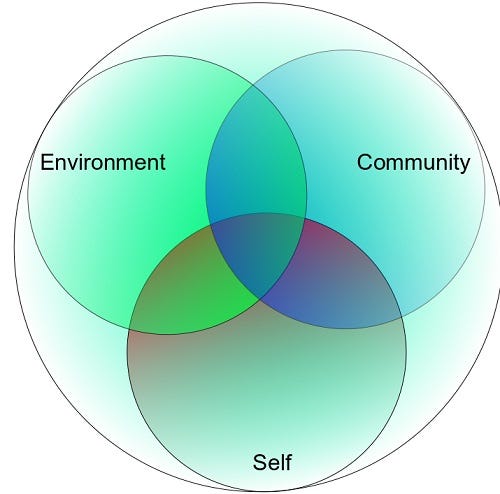Druids and Hard Decisions
Correspondences and the Oral Tradition
In the very early 1990s, I attended an advanced permaculture design course led by Bill Mollison (co-founder, with David Holmgren, of permaculture design) at Ragman's Lane Farm in Gloucestershire. It was an opportune moment and an inspiring course which I've mentioned a few times now, here on Substack.
Among other things, Bill spoke about a tribal role that has no parallel in the modern world that he tentatively referred to as that of crop master/mistress. The role had a shamanistic element to it, the person tending to live aside from others, on an edge between the community and the wild. It was their responsibility to oversee and manage both tribal needs and environmental resources by observing natural phenomena and occurrences and relating these to sets of correspondences encoded in verse and song.
I'll talk more about correspondences below but for now, to continue with Bill, he mentioned the Koori of Australia as an example, where the crop mistress/master might notice, say, a particular flower in unusual profusion and by relating this to the oral tradition, find it forewarned of an impending, sustained drought. The oral tradition would also contain a solution, that it was necessary to adjust the behaviour of the tribe by, say, no longer hunting red kangaroo, until further observations and correspondences were made that allowed hunting of the red kangaroo to begin again.
The action would be undertaken even if this meant starvation for some members of the tribe because if they continued to hunt red kangaroo, numbers might fall below a critical level, or other effects would accrue through the hunting that would mean that the whole tribe would be threatened by starvation. That is, crop master/mistress would impose rules (laws) for the benefit of the whole tribe and the environment, even if this meant that individuals might suffer unto death.
I would say that the crucial thing about this role is that the environment and the community are seen as one, single system, rather than two, related systems. Thinking about this role has both inspired and, at times, because of the implications, terrified me over the years.
I have a great interest in the ancient world and being a resident of Cymru (Wales) a particular interest in the Celts and in turn, the Druidic tradition1 and I think I can identify some similarities here. From my own studies of pre-history and archaeology, and put very simply, it seems likely that the people who came to be known as the Celts in Europe formed from a blending of two cultures. One was a pastoral society, based on grazing animals, including cattle and horses, originating on the Asian steppes and moving west into Europe from several thousand years BC onwards, bringing masculine Sky Gods with them2.
Europe was still largely a hunter/gatherer society with female, Mother Goddesses to the fore. In some case the Sky Gods overthrew the Mothers but in western Europe a process of assimilation seems to have occurred. Whether the Sky Gods assimilated the Mothers, or the Mothers assimilated the Sky Gods is a moot point!
So the Celtic mythologies contain both the masculine Sky Gods and the Mother Goddesses and the society was notable (and unusual) for its treatment of women who could be "kings", divorce their husbands, own property, train as warriors and the like. However, its worth noting that from the little evidence we actually have, it is generally in the aristocracy that this occurs- the role of the “ordinary” woman in society was no doubt far more limited.
Like the Koori and other tribal peoples, the Celts relied on an oral (spoken) tradition to pass knowledge down through time and, also like the Koori, that oral tradition was founded in song and verse, which is the easiest way to remember large amounts of information. According to Julius Caesar3, the lowest of the three orders of the Druids were the bards and to progress through the order of druids one was required to learn literally tens of thousands of rhyming couplets. Thus the verses of the bardic order were concerned with genealogy, clan and tribal history, hero tales and the like. The second order, the Vates, were concerned with natural history, and divination, that is, the prediction of the future from current observations (as with the Koori, red kangaroo story). The verses of the third order, the Druids themselves, related to such things as the knowledge of astronomy and navigation, from the little we know.
above: a highly imaginative representation of Druids doing Druid things…
The mountain that dominates the skyline to the south of the Mawddach estuary is Cader Idris or Idris' Chair, from which the giant Idris made his observations of the stars. Mention of a giant in landscape and place names can be seen as referring, metaphorically, to a giant of a man or woman. Hence Idris is likely to have been a renowned Druid of the distant past with particular knowledge of astronomy.
It seems to me that druidic tradition relates in some ways to this role of crop master/mistress and may well have grown from that tribal role in the original Mother Goddess peoples of western Europe. While the Celts were fiercely independent as distinct clans or families and tribes, often involved in bitter feuds with each other, the druids provided an overall "glue" that held the larger society together, mediating stresses that arose between the independent groups. Mention is made in historical sources of druids separating fighting armies and bringing an end to conflicts that threatened the larger whole.
above: another highly imaginative representation, this time of a Druidess.
I've mentioned that this oral tradition was in the form of rhyming couplets, verse and song and that this is the easiest way to memorise large amounts of information. If I consider my own past, I have a small stack of nursery rhymes, playground chants and the like that come to mind but sadly, they contain little in the way of useful information! If I add to these the myriad pop songs I grew up with in the 1960s that I feel I have completely forgotten, until I hear them again and lo! I can sing along with them! Again, it is a great pity that they don't contain much in the way of genuinely useful information....
It is not difficult to imagine how cycles of songs could contain information relevant to areas of knowledge important to survival in our distant past, such as the nature and uses of plants, what water was safe to drink, how we might find our way from place to place, over considerable distances and the like. Further, cycles of songs could relate to more specialist areas such as healing remedies or conflict resolution. The songs could be laid down when we were children, providing all the basic knowledge we needed to live in our community/environment.
When we wanted to know about something, we might ask an elder and the elder would remind us of the particular cycle and song that contained the information. They might also teach us a new cycle of songs if we wished to deepen our studies in a certain area.
Today, a vast amount of knowledge contained in that European and British oral tradition has, sadly, been lost but we can deduce some remnants and get hints of how it may have been. In particular, some simple, rhyming couplets in the form of correspondences still survive and it would be interesting to try to gather these back together. Here are some that I grew up with that you may well know:
Red sky at night,
Shepherds delight.
That was from my mother, of subsistence farming stock. My father, on the east coast where fishing was of great importance, knew it as|:
Red sky at night,
Sailor's delight.
In either case, a natural phenomena in the environment is used to make a prediction of a future event. So too with this one which we find can be remarkably accurate:
Mackerel sky,
Twelve hours dry.
above: not a perfect Mackerel sky but the best I’ve got…
It is interesting in our current cultural context to consider the lack of the role of crop mistress/master. While many people are well aware of the enormous environmental and social challenges we face, many are waiting for our "leaders" to do something, to get tough and set the rules and restrict our activities (take fossil fuels "off the menu", for example).
However, our current cultural context is radically different. In tribal times, protection of the tribe and the environment were paramount and the main focus of tribal law was concerned with this. The individual was, to an extent, expendable. For us in "westernised" cultures however, the emphasis of law moved to the protection of the individual and the individual's property and it is only relatively recently that environmental laws have appeared.
From an integral perspective it seems to me that we need to accept this role in ourselves and for ourselves. It is for us as individuals to make the hard decisions to safeguard our communities and environments. When I attended my first permaculture design course back in 1989, the third ethic4 was given as a couplet:
Limits to consumption,
Give away surplus.
When I asked the course leader, Andy Langford, who was to make these decisions, he pointed at me and said, “you!”; for me it was probably the most inspiring moment of the course. So it is for us to make the hard decisions, for ourselves and in so doing we may find that it is not so hard after all, especially if we find supportive sisters and brothers to aid us in our decisions.
Many thanks for reading. Please, add your comments and suggestions for where to go next. What do you want to hear more about? Let me know and help steer this work.
Druids…it is worth pointing out that by far the bulk of what has been written about the Druids, particularly in the last several hundred years, beginning with Iolo Morgannwg, a bit of a genius but also a great Cymric forger, is largely imaginative nonsense. The actual evidence from times anything close to contemporary with the Druids is scant indeed and usually written by conquering peoples (like the Romans) and is often laden with anti-Druid propaganda. However, two books I have read deserve mentioning as being grounded in actual evidence of a variety of types. For anyone who might be interested in learning more, they are as follows:
Anne Ross; Druids, Preachers of Immortality pub. Tempus 2004
Peter Beresford Ellis; The Druids pub. Robinson 2001
Barry Cunliffe; By Steppe, Desert and Ocean; the Birth of Eurasia Oxford University press
Barry Cunliffe; Europe Between the Oceans, 9000 BC-AD 1000 Yale University Press
Julius Caesar, the Gallic Wars, 6.13.
for those who are not familiar with the ethics of permaculture design, Peoplecare and Earthcare are the first two, thus including the tribal perspectives of community and environment. Given the growth of ego and the sense of self and the relative power and influence of individuals today, it is essential to include limits or controls, hence I believe the third ethic should be concerned with the individual. There is much more to say about this but not here... The third ethic later became Fairshares and I have written more about this and why I see it as a missed opportunity, here.


